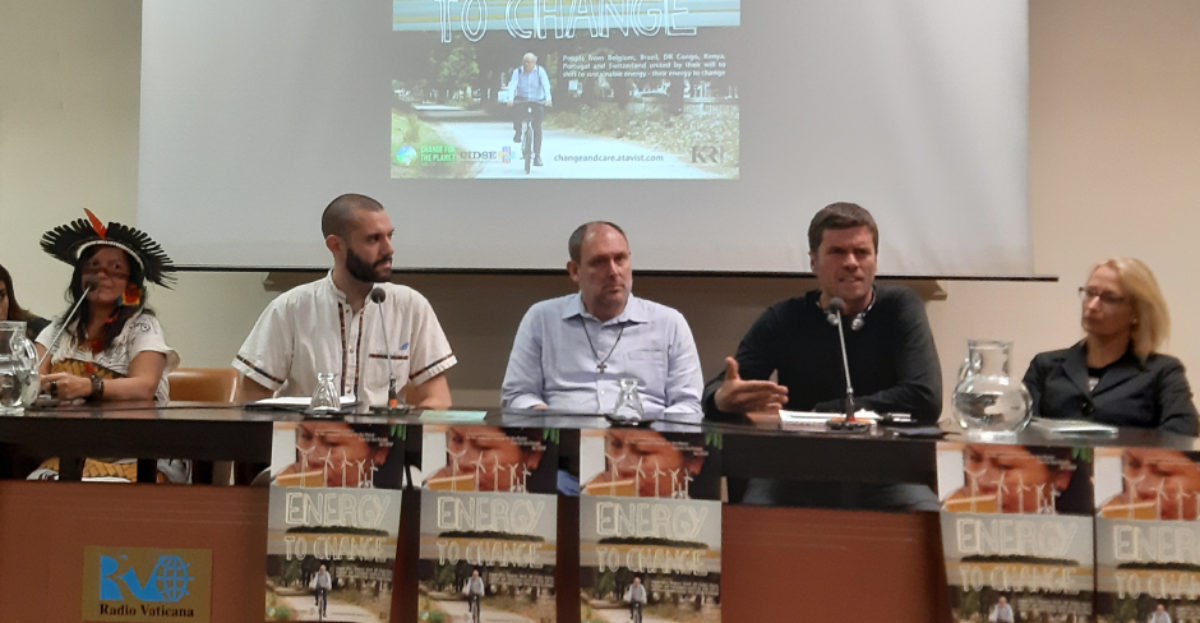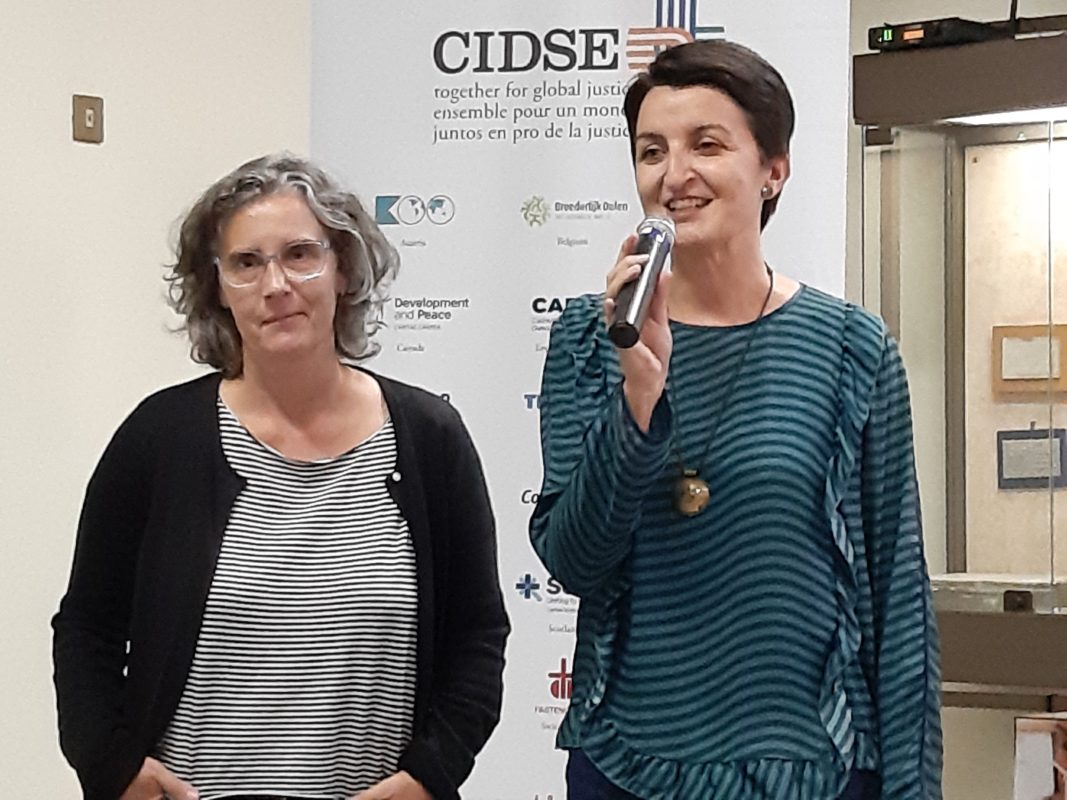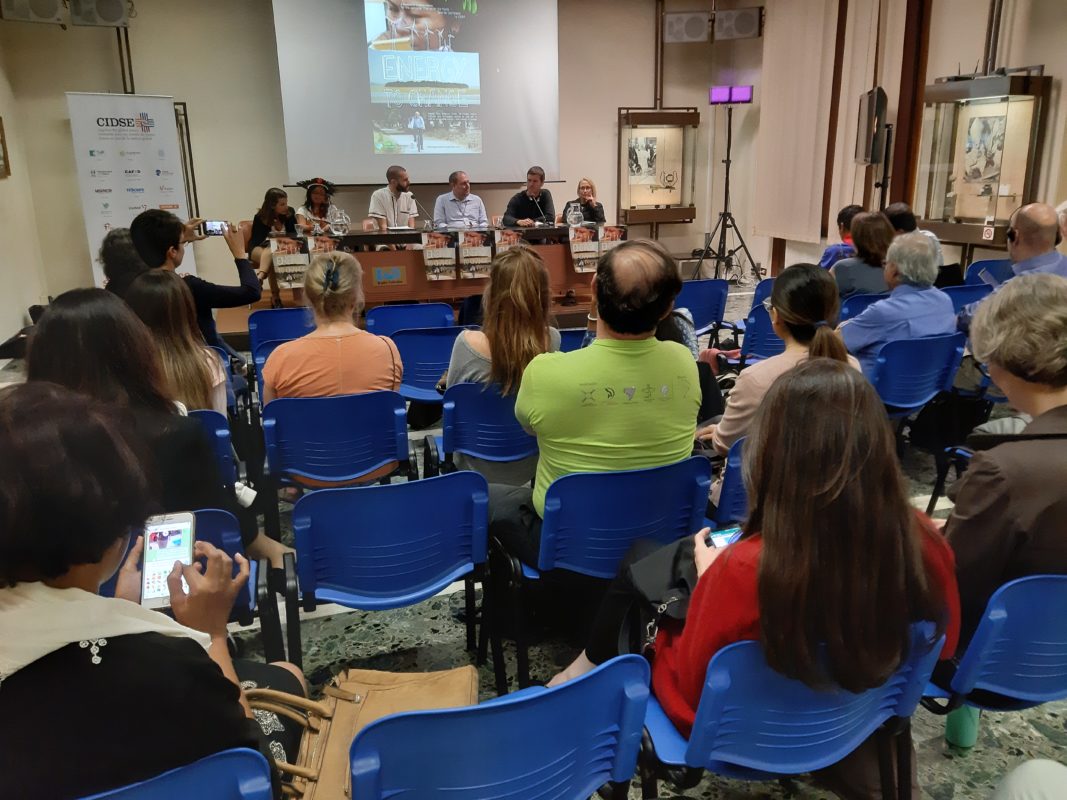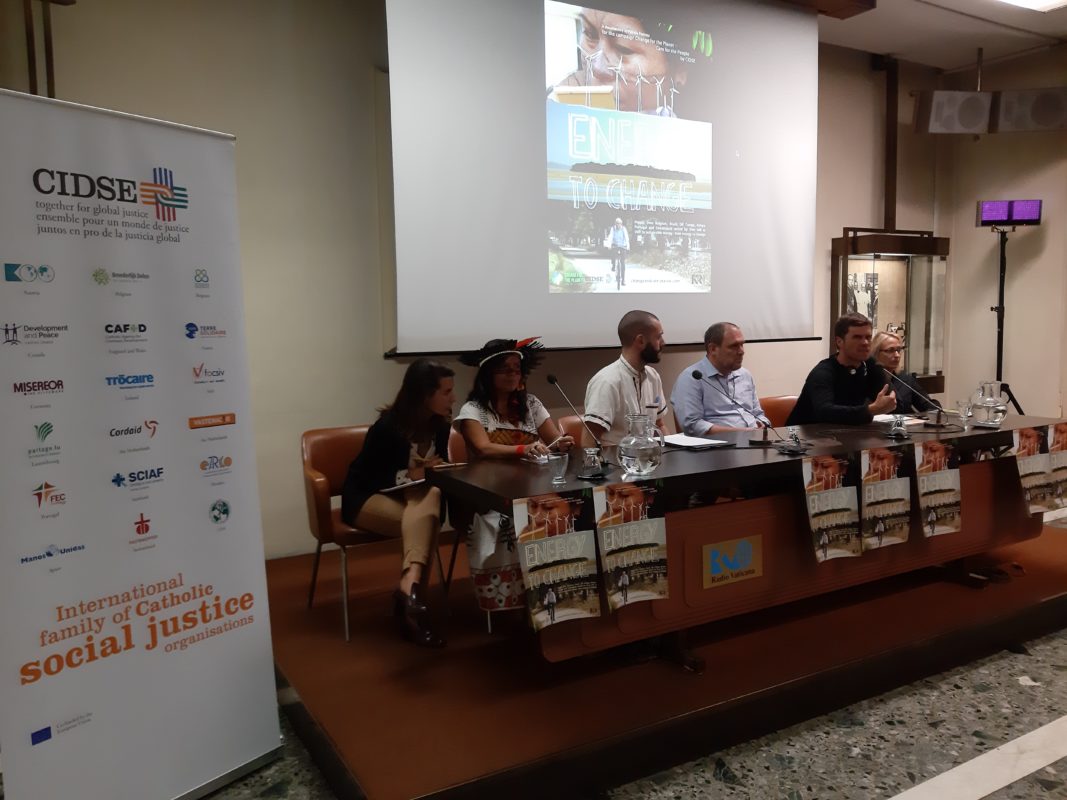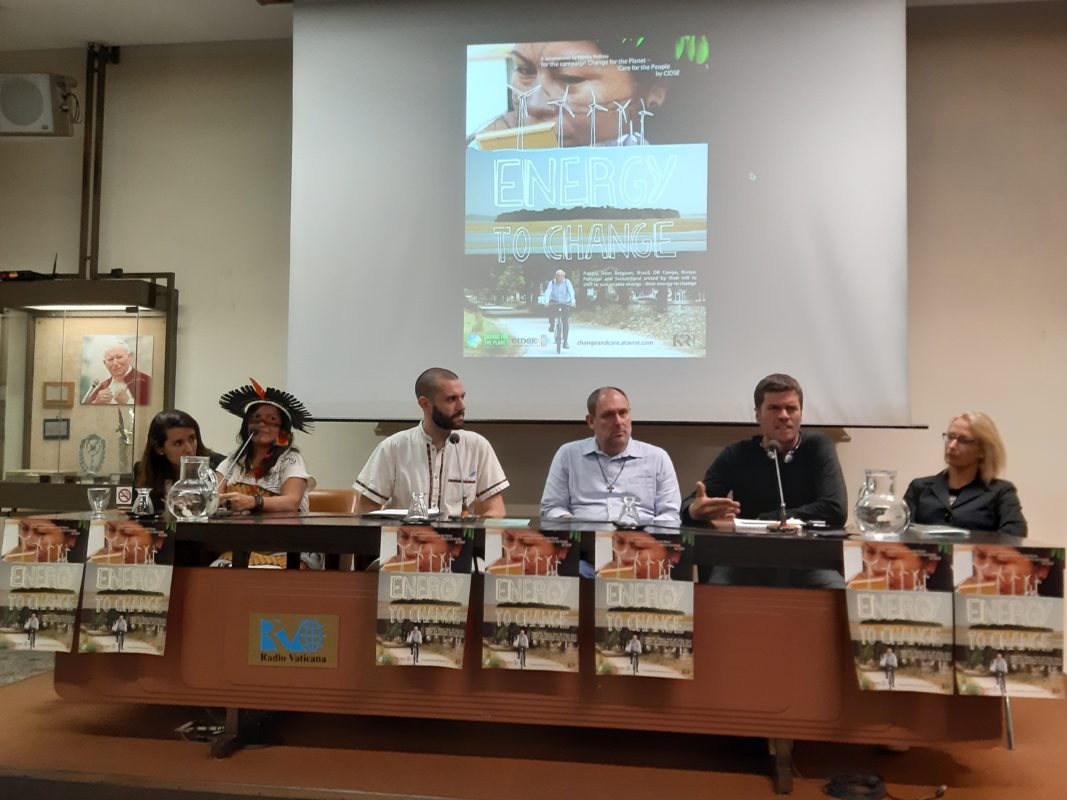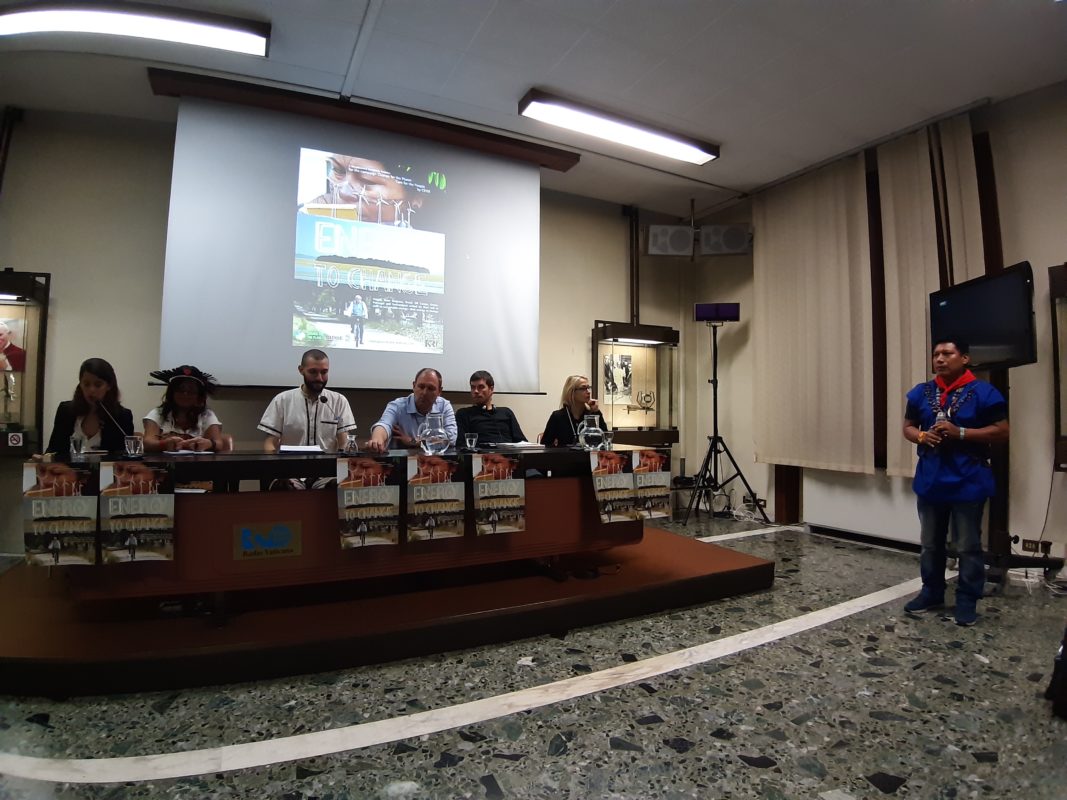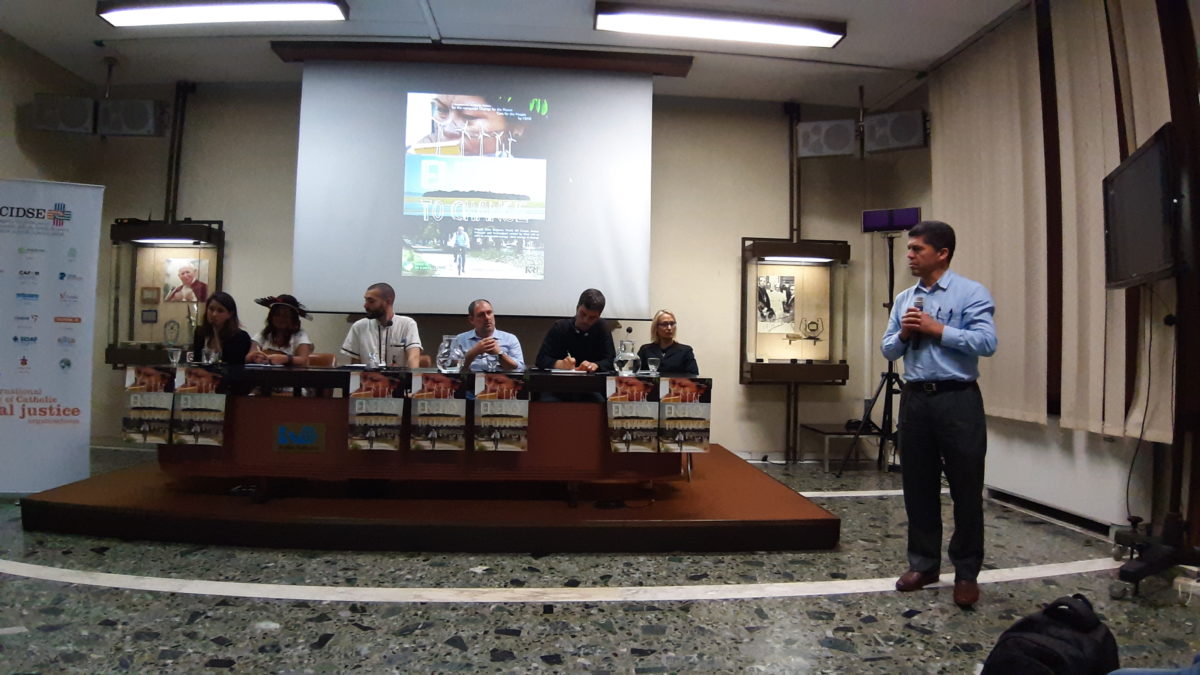Last October, during the Amazon Synod in Rome and as an event of “Amazon Common Home“, CIDSE with its campaign “Change for the Planet-Care for the People”, organised in Sala Marconi (Vatican News) with FOCSIV and FASTENOPFER and with the support of the KR foundation, the screening of the Documentary “Energy to Change” subtitled in Italian (“Energy to Change” documentary is also available with subtitles in DE – ES – FR – IT – NL – PT). Following the screening there was a round table with the participation of some of the persons involved in the production of the film, and opening the debate with the audience.
The way people produce and access energy is a crucial aspect of life, because energy is essential to our wellbeing, and simultaneously we must avert climate change to save life on earth
The event was introduced by Chiara Martinelli and Patricia Pedrosa, the movie director (Portugal) , and they introduced the rest of participants in the round table:
- Stefan Salzmann, Climate and Energy Officer, Fastenopfer (Switzerland)
- Fr. Herman Augustyns, priest of St Anne Parish (Belgium)
- Francesca Novella, Policy Officer, Focsiv
- Nag Sateré, COPIME – Coordination of the Indigenous Peoples of Manaus and Surroundings (Brazil)
- With the participation from the public of Pablo Fajardo (UDAPT’s lawyer, Association of Texaco’s victims (Ecuador).
The documentary Energy to Change follows six stories of the personal energy choices of communities and people across the world. From riding bicycles to defending the Amazon from hydropower dams, these heroes are doing their part for an energy transition that respects the needs of people and the planet. Right after the screening, there was a round table with people involved in the production of the film, and a space for open questions from the audience.
The documentary was introduced by Patricia Pedrosa, the movie director from Portugal. Patricia focused on her work and the messages behind the movie. Her anthropological studies allowed a deep relation with some of the main characters, clearly sharing the reasons behind their choices. The documentary is like being welcomed in their characters houses, in their daily lives and having a dialogue with them.
The first person sharing his experience was Stefan Salzmann, Climate and Energy Officer, Fastenopfer (Switzerland). He started talking about Kalkbreite, the cooperative in the heart of Zurich that proves that those who share can have a lot without posses a lot. By doing so, people can enjoy a good life without abusing the planet’s resources. “You don’t have to be a renunciation champion wearing woolen socks if you want to live ecologically”. In the building, there are also apartments for single families and individuals. In addition, every house can be built in this style – it just needs the will to follow this path. A good life is possible, in line with the ecological behavior: this is exactly the potential of this project. This living simply solution allows him to devote less time to paid work and spend more time with his two children.
Fr. Herman Augustyns shared the story and the concept behind Sint-Anna-ten-Drieën, one of the eco-churches of Flanders. Investments have already been made in 45 solar panels on the roof of the church, a well for rainwater for the reuse of rainwater for the drainage of toilets and the cleaning of the church, a sorting lane for the separation of waste. The use of bicycles is also promoted in this church for bicycles with safe bicycle parking, a picnic area for passers-by, a fountain for drinking water and the possibility of charging electric bicycles. The church’s cycle path also starts from the church. This modern church is not used exclusively for worship. Every year there are also about 20 concerts and 1-3 exhibitions.
Francesca Novella, Policy Office at Focsiv, presented the “GUIDE FOR ECOLOGICAL COMMUNITIES AND PARISHES”. This Guide is the result of the work of translation and adaptation by FOCSIV, in collaboration with Retinopera and the National Office for Social Problems and Work of the CEI, of the “Eco – Parish Guide” produced by the Global Catholic Climate Movement (GCCM). The original text provides practical suggestions for applying Pope Francis’ Laudato Si’, with particular reference to international, American, Asian and European initiatives. In addition to that, FOCSIV added experiences from Italian dioceses and parishes, bringing the Guide closer to the national and local context. They decided to focus on concrete actions, corresponding to grassroots capacities and means. In this way it will be easier to contribute to stabilize the climate of our planet and to take care of those who have been damaged by climate change. The Guide has an international character because climate change is a global phenomenon that transcends the borders of our communities and countries. A special focus is the one at local level, starting with individuals’ behaviour in families and communities, in neighbourhoods and cities.
Marcivana Sateré Mawé, her indigenous name is Nag Sateré. She’s part of COPIME – coordination of the Indigenous Peoples of Manaus and Surroundings. She is currently a counselor of CES / AM – Health Council of the State of Amazonas. She has a degree in Accounting. In Manaus, they are 54 Indigenous Organizations, from 45 peoples, with seven languages spoken. She currently lives in Manaus and was born in Maués, a territory traditionally occupied by the Sateré Mawe. Nag means elder, one who is wise. The main added value she brought to the roundtable was her direct witness as indigenous leader affected by ecologically unsustainable behaviors. Their way to live in harmony with the forest and with the natural resources, was perfectly fitting with the Brazilian documentary character story. Her tribe and the one in the documentary, are facing the same struggles and the same threats by those who see the nature and a stock to exploit only.
The event had the special participation of Willian Lucitante, indigenous from Cofan People of Ecuador and his lawyer Pablo Fajardo, an Ecuadorian lawyer and activist. He is the lawyer that has been leading the historical process against Chevron Corporation related to the environmental disaster he alleged was caused by the oil operations of Texaco (acquired by Chevron Corporation in 2001) in the Lago Agrio oil field between 1964 and 1990. Both explained the process and situation of over 30, 000 local inhabitants affected by the spill of crude oil and toxic waste, whom Pablo represents. This other story brought even more visible the negative impacts of big companies (and indirectly our lifestyles and ecological behaviors) on the Global South.
To close the roundtable and the event Stefan Salzmann presented as a scoop , the video titled “To What End – The appeal of Beka Munduruku” cofunded by Fastenopfer AND realized by their partner in Brazil, the organization UMA GOTA NO OCEANO that express the challenges and dangers that are facing everyday indigenous people in Amazon: extractivism.

